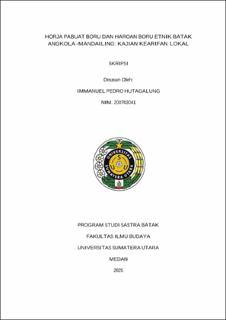Horja Pabuat Boru dan Haroan Boru Etnik Batak Angkola-Mandailing Kajian : Kearifan Lokal
Horja Pabuat Boru and Haroan Boru in the Angkola-Mandailing Batak Ethnic Group: A Study of Local Wisdom

Date
2025Author
Hutagalung, Immanuel Pedro
Advisor(s)
Herlina
Purba, Asriaty R
Metadata
Show full item recordAbstract
This study explores the traditional marriage ceremonies Horja Pabuat Boru and Haroan Boru among the Batak Angkola-Mandailing ethnic group, focusing on the ceremonial stages and the local wisdom values embedded within. Utilizing Robert Sibarani’s (2014) theory of local wisdom, the research applies a qualitative descriptive method to analyze and document these cultural practices.
The traditional ceremony is divided into two major phases: the pre-Pabuat Boru phase and the Pabuat Boru and Haroan Boru phase. The pre-Pabuat Boru stage includes five key steps: (1) Manyapai Boru, (2) Marsapa Batang Boban, (3) Marpege-Pege, (4) Patibal Sere, and (5) Mangalehen Mangan Pamunan. The main ceremonial stage comprises fifteen parts, including (6) Mangido Adat, (7) Akad Nikah, (8) Palakka Boru, (9) Pabuat Boru, (10) Mangambat Boru Tulang, (11) Manyattan Boru, (12) Mangalo-alo Boru, (13) Mangalo-alo Mora, (14) Panaek Gondang, (15) Mata ni Horja, (16) bringing the couple to Tapian Raya, (17) Mangalehen Goar, (18) Mangupa, (19) Mangoloi na Loja, and (20) Marulak Ari.
These stages reflect rich local wisdom values that are still upheld by the community. The values identified include: politeness, honesty, social solidarity, harmony and conflict resolution, commitment, positive thinking, gratitude, hard work, discipline, education, health, mutual cooperation, gender management, cultural preservation and creativity, and environmental awareness. These values function as a form of cultural capital that reinforces identity, strengthens social bonds, and sustains community resilience. Through this research, traditional ceremonies are not only documented but also interpreted as vital mechanisms for transmitting cultural values across generations. The study underscores the importance of preserving these traditions in the face of modernization and cultural homogenization.
Collections
- Undergraduate Theses [247]
